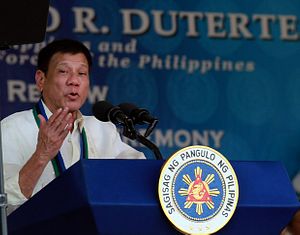Philippine President Rodrigo Duterte vetoed the Subscriber Identity Module (SIM) Card Registration Act two months after it was ratified by the House of Representatives and the Senate. The president’s spokesperson said the veto was due to the inclusion of mandatory social media registration in the measure.
“[He] was constrained to disagree with the inclusion of social media in the measure, without providing proper guidelines and definitions thereto, as the same may give rise to a situation of dangerous state intrusion and surveillance threatening many constitutionally protected rights,” said presidential spokesperson Martin Andanar.
He added that the president wanted to ensure that new laws are consistent with constitutional provisions guaranteeing individual privacy and free speech.
The threat of state surveillance and the undermining of civil liberties were also among the reasons cited by concerned citizens and groups when they opposed the measure in Congress.
It is ironic for Duterte to worry about state intrusion and freedom of expression since his government is accused of committing grave crimes against humanity. He even supported the closure of the country’s biggest media broadcaster and described it as a victory against oligarchs. It is suspicious that he apparently understands the dangers of social media registration but sees nothing wrong with the draconian provisions of the Anti-Terrorism Act, which he signed into law without reservations in 2020.
In the eyes of Senate Minority Leader Franklin M. Drilon, the president’s veto is rather a “big win for troll farms.”
“There were enough safeguards. Unfortunately, the veto is nothing but to protect troll operators and troll armies, some of them are in Malacanang (presidential palace),” Drilon said.
“By vetoing this bill, the President lets trolls thrive, spread lies and hate, and fuel discord and division,” he added.
Drilon was right to question the motive of Duterte, including his silence about the existence of a state-funded troll army spreading disinformation and even violence against the president’s critics. But Drilon’s position equating online anonymity with criminality and his proposal penalizing the creation of fictitious social media accounts have been opposed by activists, civil society groups, and media freedom advocates.
It is unfortunate that Drilon, a veteran lawmaker and lawyer who has called out the excesses of the Duterte government, could not understand how the mandatory registration of SIM cards and social media accounts could be easily used and misused by authorities to silence the opposition. He should listen to what other opposition legislators have been saying about the bill.
For example, House Deputy Minority leader Carlos Isagani Zarate reiterated his warning that the measure will violate the privacy rights of citizens. “We already pointed out that it would give government easy access to the people’s SIM card and [let authorities] acquire all the data on the subscriber that the telecommunications company may give.”
Drilon should also listen to fellow Duterte critics like activist Nato Reyes, who pointed out the hypocrisy of the government in invoking the need to protect free speech but doing nothing to prevent cyberattacks targeting independent journalists and people’s organizations.
“A big part of the problem is the government itself as it benefits directly and indirectly from nefarious online activities. Violations of privacy through measures such as the SIM card and social media registration will not solve these problems. We should start with demanding the government stop weaponizing social media and attacking people online,” he said.
Meanwhile, Duterte’s allies are not yet giving up on the measure. Senate President Vicente Sotto III hinted that Congress could overturn the veto in May while the questionable provisions in the law could be challenged by the president’s office in the Supreme Court. Sotto added that even after the veto, the government should continue to require the registration of new SIM cards before their activation.
Several legislators have also announced that they will refile the measure in the next Congress, but said they will file separate bills on SIM card registration and social media registration.
As for activists and human rights groups opposed to the law, they should take this opportunity to engage the authors of the law and other legislators who think that the measure will penalize the work of trolls. As an alternative, they should urge Congress to focus on public education about cybercrimes, digital safety literacy, and the protection of digital rights. They should also remind legislators that before passing another measure that seeks to stop cybercrimes, Congress should first initiate a review of how the 2012 Cybercrime Prevent Act is being implemented by authorities.

































